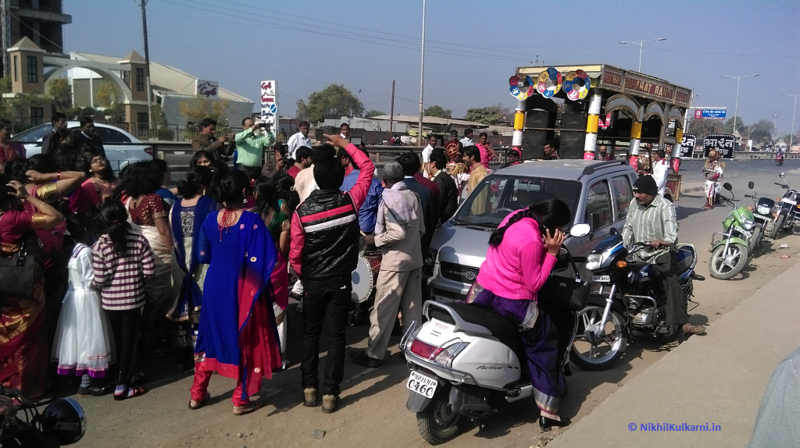The photograph below is a scene from the incredibly buzzing and busy Tier 2 city - Ujjain - in India; a center of religious tourism in central India. The precise location - a service lane to a otherwise important highway connecting the city of Ujjain to three other nearby cities of Bhopal, Indore and Gwalior.
A marriage procession (Baraat, बारात ) on its way blocking the whole road while the car (silver grey, Maruti Suzuki WagonR) patiently awaits passage. An impatient lady on the scooter tries to manoeuvre from the gap on the side, when an unchivalrous biker coming from the opposite end blocks her way. While in this logjam, the lady's mobile phone rings and without regard for the cacophony she is in, she decides to take the call.
Moments later the procession will move on, the car will find its way forward and both the woman and the biker shall hurry towards their respective destinations. The ensemble cast in this photo will reach their respective destinations and discuss their travails this morning, increasing traffic, decreasing civility in the society and overall lack of infrastructure in the city; with the same tone and fervour which the English associate to their discussions on the weather.
Chaos, confusion, spontaneity - all hallmarks of Incredible India in one frame!
A marriage procession (Baraat, बारात ) on its way blocking the whole road while the car (silver grey, Maruti Suzuki WagonR) patiently awaits passage. An impatient lady on the scooter tries to manoeuvre from the gap on the side, when an unchivalrous biker coming from the opposite end blocks her way. While in this logjam, the lady's mobile phone rings and without regard for the cacophony she is in, she decides to take the call.
Moments later the procession will move on, the car will find its way forward and both the woman and the biker shall hurry towards their respective destinations. The ensemble cast in this photo will reach their respective destinations and discuss their travails this morning, increasing traffic, decreasing civility in the society and overall lack of infrastructure in the city; with the same tone and fervour which the English associate to their discussions on the weather.
Chaos, confusion, spontaneity - all hallmarks of Incredible India in one frame!

We Indians are so used to being inconvenienced during our daily lives that it does not bother us on most occasions.
ReplyDelete